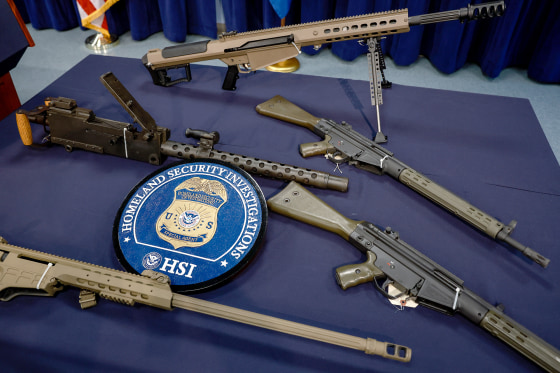The Department of Homeland Security is trying to stop the illegal flow of high-powered weapons from the U.S. to Haiti, as the Caribbean nation reels from violence and instability wrought by armed groups and gangs.
A 2023 United Nations report identified the U.S., particularly Florida, as the principal source of firearms and munitions largely smuggled into Haiti. Now, as armed groups take over broad swaths of Port-au-Prince with gunfire from sniper rifles, machine guns and other potent weapons, the U.S. is trying to seize the weapons at a facility in South Florida before they leave the country.
“These weapons are getting into the wrong hands,” DHS Special Agent Anthony Solvere told NBC News. “They can do untold damage.”
These “very potent weapons,” he added, were far beyond what was traditionally seen in the Caribbean, indicating a dangerous escalation.
Get top local stories in Connecticut delivered to you every morning. Sign up for NBC Connecticut's News Headlines newsletter.
Matt Schroeder, a senior researcher at the Swiss think tank, Small Arms Survey, said the smugglers’ goal is to camouflage the shipments to evade authorities, who face the daunting task of screening millions of shipments in and out of ports. “It is effective because authorities can’t possibly screen every shipment that comes into and leaves U.S. ports,” he said.
Solvere, who is in charge of Homeland Security Investigations in Miami, explained the challenges of detecting these weapons leaving the country, adding that they could be hidden in various ways, including inside consumer products, electronic equipment, garment linings, frozen food items or even the hulls of freighters. Some guns were found hidden in wooden pallets disguised as humanitarian aid.

He said that smugglers are likely exploiting a loophole that allows cargo with a handwritten manifest worth less than $2,500 to avoid inspection, making these parcels an ideal place to conceal weapons.
U.S. & World
The HSI’s findings underscored the urgent need for international cooperation and targeted enforcement to combat weapons smuggling. With the ongoing violence and political instability in Haiti, according to the U.N. report, stemming the flow of illicit weapons is crucial to restoring stability and security in the region.
“The impact of gun smuggling is indisputable in situations like in Haiti,” Schroeder said. “If you see the violence and the ability to challenge authority, it’s dependent on access to illegal weapons. They could not do what they’re doing now in terms of seizing control, effectively seizing and controlling territory, challenging control and terrorizing the population if they did not have access to these illegal weapons.”
Beyond efforts in Miami to stanch the flow of guns and other weapons into Haiti, a group of lawmakers has introduced the Caribbean Arms Trafficking Causes Harm (CATCH) Act to curb the flow of illegal firearms that have been fueling violence and instability in the Caribbean region, particularly in countries like Haiti.
“Weapons trafficking by way of the United States is a major contributor to Haiti’s growing gang crisis and the current instability that plagues the country,” Rep. Sheila Cherfilus-McCormick, D-Fla., said in a statement in March.
The bill, which she introduced in the House, focuses specifically on addressing the challenges of arms trafficking to the Caribbean by requiring the Coordinator for Caribbean Firearms Prosecutions to report on implementation efforts and coordination with federal, state and local law enforcement agencies. It builds upon previous legislative efforts, such as the Bipartisan Safer Communities Act signed into law by President Joe Biden in 2022, which created federal criminal offenses for firearms trafficking.
Gédéon Jean, founder and director of the Center for Human Rights Analysis and Research, emphasized the urgent need for international intervention to address the escalating violence and instability in Haiti, where gangs have taken control of significant territories. He highlighted the critical role of foreign military deployment in supporting local law enforcement efforts to restore peace and stability.
“I don’t think the U.S. will deploy in Haiti, but the first thing Haiti needs at this moment is for foreign military to be deployed and help the police bring stability and safety,” Jean said. “Haiti needs urgent help. If there’s no urgent intervention, the gang or gangs? will take full control of Haiti, and that’s their intention.”
The U.S. plans to offer $200 million to the Multinational Security Support Mission to aid the Haitian National Police in various areas and is encouraging other countries to support the mission. Additionally, Biden has approved a $10 million assistance package, which may include weapons, ammunition, bulletproof vests and helmets for Haitian security forces to protect critical infrastructure and support peaceful transition efforts.
This story first appeared on NBCNews.com. More from NBC News:
- Top Democrats won't join calls for Justice Sotomayor to retire, but still fear a Ruth Bader Ginsburg repeat
- Suspects in the stabbing of an Iranian presenter fled U.K. after attack, counterterrorism police say
- Ugandan court rejects bid to nullify anti-gay law that provides for the death penalty in some cases



